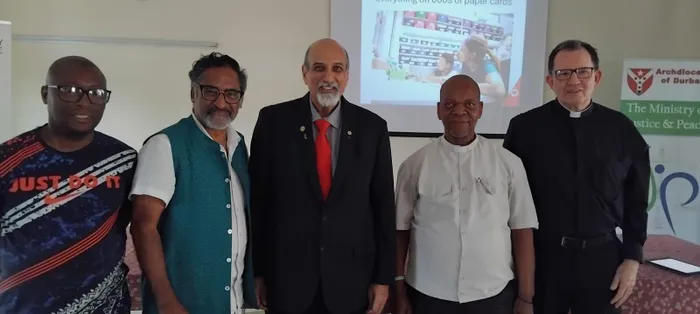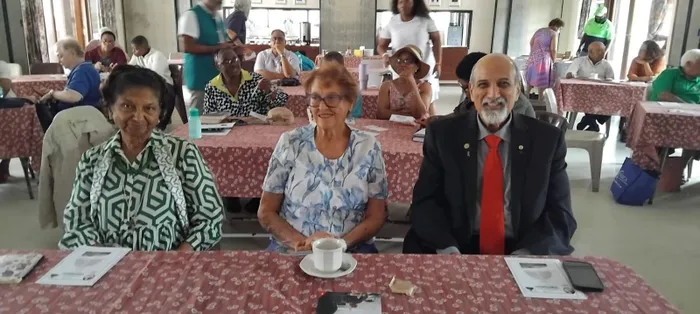
At the annual Archdiocese of Durban-Memorial Justice and Peace lecture were, from left: Kalie Senyane, Dr Raymond Perrier, Professor Salim Abdool Karim, Auxilliary Bishop Elias Zondi, and Chancellor Julian Davey.
Image: Zainul Dawood
Institutional disinformation presents a new challenge and calamity to the world post-Covid era, said Professor Salim Abdool Karim during a discourse on justice and peace held in Durban on Saturday.
He was speaking at the annual Archdiocese of Durban Justice and Peace lecture in honour not just of Archbishop Denis Hurley but also Archbishop Abel Gabuza, who died at the beginning of Covid. Gabuza had followed Hurley as the Catholic bishop who led on justice and peace in South Africa.
Karim spoke about countering disinformation post-Covid-19 and upholding the truth. He also touched on the art of South African state capture and the five elements of former US President Donald Trump's policies. Both, he said, spread misinformation to hide the truth.
"To accumulate wealth and power, you have to hide the truth in captured states - the truth is more than inconvenient. Information is power, disinformation is an abuse of power," he said.
He said that Trump has also attacked government scientists, science agencies, and budgets.
Karim, referring to his book Standing up for Science, informed people on how to deal with disinformation. These include:
Karim also touched on his extensive research on Covid and his briefings with several governments globally.
"While sharing information on Covid, we came across the war on disinformation, where truth became the casualty. Social media has transformed the way we access information. Speculation in social media masqueraded as fact. You did not know the person behind it. This kind of information not only misinformed but also caused polarisation in society and drove a wedge among us," he said.
Karim stated that social media does not have editorial quality assurance or minimal fact-checking, adding that South Africans were losing billions through scammers who request banking details or get access to people's bank accounts through disinformation on social media.
"We need to foster a society that is aware of these scammers," he added.
Dr Raymond Perrier, director of the Denis Hurley Centre (DHS), spoke about the misunderstandings and disinformation that were taking place around hospitals, where a group of people were preventing undocumented migrants from entering hospitals and clinics.
He was concerned about the falsehoods being peddled to the public. He said there was also disinformation being spread about homeless people in Durban.
"A group created this perception that people from other African countries were some kind of demons and undermined our institutions. Part of our role at the Denis Hurley Centre is to be a voice for the voiceless. We sent a strong statement decrying what was happening. We need to speak out when we see injustice," he said.
zainul.dawood@inl.co.za

At the annual Archdiocese of Durban-Memorial Justice and Peace lecture from right; Professor Salim Abdool Karim, Coral Vinsen and Betty Govinden.
Image: Zainul Dawood
Related Topics: